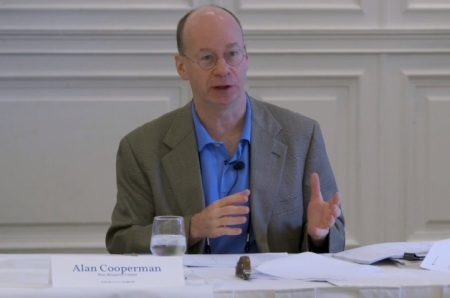4 myths about white evangelical voters

There are four common myths today about trends among white evangelicals that aren’t backed up by data, a Pew pollster has detailed.
Alan Cooperman, the director of religion research at the Pew Research Center, spoke earlier this month with journalists at the Faith Angle Forum held in Miami Beach, Florida, hosted by the Washington, D.C.-based think tank Ethics & Public Policy Center.
Speaking during a panel discussion on “America’s Religious Vote: Midterms and New Trends,” Cooperman outlined what he says are “straw men” arguments, or “myths,” that he hears being asserted in political discussions today.
Four of those myths involve some common misconceptions about white evangelical voters.
Myth 1: Evangelicals are turning liberal or turning against Trump
While there certainly are some white evangelicals who are staunch in their opposition to President Donald Trump, he doesn't see any rise in their numbers in Pew data.
Citing aggregated Pew Research Center data compiled from 2017 to 2018, Cooperman stated that there is “a lot of stability” when it comes to Trump’s approval ratings among self-identified white evangelical or born-again Protestants.
“Right up before the election, aggregated data from our polls over the last several months [showed] 71 percent approval rating for the president [among white evangelicals],” Cooperman said. “If anything, party ID among white evangelical Protestants is trending more Republican. This notion that white evangelical Protestants are turning liberal, I don’t see. … I don’t see it anywhere.”
According to annual totals of Pew Research Center survey data, 77 percent of white evangelical registered voters identified as Republican or leaned toward the Republican Party in 2017.
Myth 2: Younger evangelicals are more liberal and are turning Democratic
Within this notion that evangelicals are becoming more liberal, he said, is the notion that “it is not evangelicals as a whole that is turning liberal, it's the young ones.”
“They are [saying] the youth and young evangelical Protestants are much more liberal than their elders,” he continued. “That is true on some issues. It is especially true for homosexuality and same-sex marriage. [But] it’s not true on abortion, and it is not true in terms of party identification.”
Citing data from the 2014 Pew U.S. Religious Landscape Study, Cooperman stated that 66 percent of millennial white evangelicals identified as Republican or said that they "leaned Republican," while 65 percent of older white evangelical Protestants said the same. Aggregated Pew data from 2017 and 2018 shows that 77 percent of millennial white evangelical Protestants are Republican or lean Republican, while 16 percent said they are Democrat or lean Democrat. By comparison, just 51 percent of white millennial mainline Protestants and 11 percent of black Protestant millennials identified as Republican or leaned Republican.
“Now you will see looking on things like environmental regulations, young evangelicals are more liberal on that,” he said. “They are less antagonistic towards immigration. They are less likely to oppose same-sex marriage. But on abortion, the younger evangelicals are just as strongly, or even more strongly, opposed to abortion than older evangelicals. Again, no difference in terms of party ID.”
The 2014 Religious Landscape Study found that 75 percent of millennial white evangelicals think abortion should be illegal in all or most cases, while just two-thirds of older white evangelicals said the same.
Cooperman said that some may think that if millennial evangelicals or Catholics are more liberal on certain issues than older evangelicals or Catholics, it could mean that they will “gradually move their religious groups to the left" politically.
“I don’t have a crystal ball so I don’t know. It is true that younger folks, on the whole, are more liberal, left-leaning. [But] I think there is a reason to be cautious that that possibly they are not going to move their religious groups to the left as a whole,” he said.
Citing Pew data that breaks down each religious group in the U.S. by generation, Cooperman said that he doesn’t see a “clear line in which the younger generations are more Democratic-leaning than the older generations.”
“It is not true among white evangelicals. … It is not true among white mainline. It’s not true among black Protestants. It’s not true among white Catholics. It’s not especially true among Hispanic Catholics,” he stated.
The one major group in which millennials are clearly more Democratic-leaning than older generations is the religiously unaffiliated – a rapidly growing category.






















